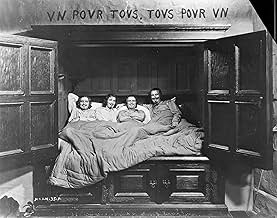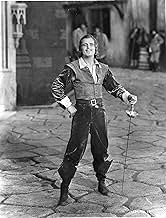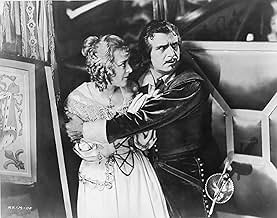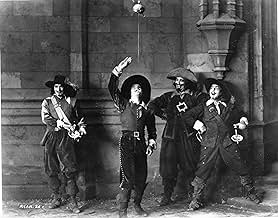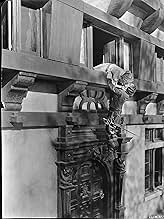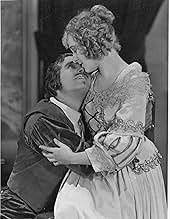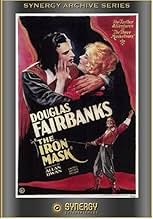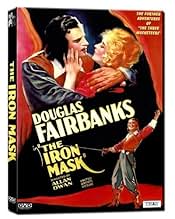King Louis XIII of France is thrilled when his son is born--an heir to the throne. But his Queen has actually delivered twin boys. Cardinal Richelieu sees the second son as a potential for r... Read allKing Louis XIII of France is thrilled when his son is born--an heir to the throne. But his Queen has actually delivered twin boys. Cardinal Richelieu sees the second son as a potential for revolution, and has him sent off to Spain to be raised in secret to ensure a peaceful futur... Read allKing Louis XIII of France is thrilled when his son is born--an heir to the throne. But his Queen has actually delivered twin boys. Cardinal Richelieu sees the second son as a potential for revolution, and has him sent off to Spain to be raised in secret to ensure a peaceful future for France. Alas, keeping the secret means sending Constance, lover of D'Artagnan, off t... Read all
- Awards
- 2 wins total
- Porthos
- (as Stanley Sandford)
- Undetermined Secondary Role
- (uncredited)
- DeRochefort's Ruffian
- (uncredited)
Featured reviews
Generally this is an inferior film to the amazing 1921 "Three Musketeers". Allan Dwan is not the visual stylist that Fred Niblo is, and so "The Iron Mask" becomes much more of a straightforward action film. But as such it is splendid. I think we tend to forget what a good actor Fairbanks was. His emotional journey here is quite powerful as he faces the death of his lady and of his friends - and he ages convincingly as well.
Most of the cast is different to the "Three Musketeers" but Margueritte de la Motte returns as Constance and the unforgettable Nigel de Brulier again plays Richilieu with extreme venom.
Fairbanks has an athletic field day as well. There seem to be a number of versions of this film around. The one I saw ran 95 minutes and had tinted sequences. I've seen some advertised as having talking sequences, and others with narration by Douglas Fairbanks Jr - the one i saw had neither of these.
It was probably the last large scale silent feature made in Hollywood. And that is what gives those gorgeous last minutes such power. The silent era was truly the golden years of Hollywood and Fairbanks was its king - in this film he sadly abdicates.
It's an excellent rendition from the immortal novel with quite budget and spectacular action . The picture contains rousing scenes , intrigue , derring-do , exciting swordplay , romantic adventure , mayhem , a lot of fun and is pretty entertaining . It's a silent movie with two brief speeches by Douglas Fairbanks at the beginning and intermission . In this film, the Four Musketeers - Athos, Porthos, Aramis, and D'Artagnan - all sleep together in one bed, with the French phrase 'Un Pour Tous, Tous Pour Un' , One For All, All For One, inscribed on the headboard. This entire production was under the supervision of Maurice Leloir , member of the Society of French Artists , illustrator of the Three Musketeers , the acknowledged authority on the period depicted . Marvelous casting with a magnificent Douglas Fairbanks as a valiant swashbuckler . Charming Douglas Fairbanks steals the show when he bounds and leaps , flies and run ; in addition he is the screenwriter of this rollicking adventure . Fairbanks executes athletic feats , moving sword-play and spectacular acrobatics similarly he demonstrated in other classics such as The Mark of Zorro (1920), Robin Hood (1922), Three musketeers , Don Q Son of Zorro , The gaucho , The iron mask , The Taming of the Shrew , Don Juan , Mr Robinson , among others . Douglas performed most of the stunts in his films himself. He was an excellent athlete and used his physical abilities to his best advantage. Douglas was king of Hollywood by that time and he formed his own production company ; during a Liberty Bond tour with Charles Chaplin he fell in love with Mary Pickford with whom he, Chaplin and Griffith had formed United Artists in 1919. Lush production design is well reflected on the luxurious interiors and exteriors . The motion picture was lavishly produced and well realized by Allan Dwan .The realization is fairly exciting , thanks largely to filmmaker Allan Dwan's fair play and achieving a masterly style by skillful lighting .
This classy story is subsequently remade several versions , for both TV and the big screen . Firstly this mute rendition (1929) , after that , ¨The man in the iron mask¨ by James Whale(1939) with Louis Hayward , Alan Hale and Joan Bennet , ¨The Fifth Musketeer¨(1979) by Ken Annakin with Beau Bridges , Rex Harrison , Silvia Kristel , Ursula Andress ; ¨Iron mask¨(1997) by William Richert with Timothy Bottoms , Edward Albert , James Gammon , Dana Barron , Meg Foster and finally ¨The man in the iron mask¨ (1998) , a big production by Randall Wallace with Leonardo DiCaprio , Gerard Depardieu , John Malkovich , Jeremy Irons . And TV adaptation of the classy ¨Iron mask¨ (1977) by Mike Newell with Richard Chamberlain , Jenny Agutter , Ian Holm , Ralph Richardson .
Douglas Fairbanks, silent cinema's greatest swashbuckling hero, bid farewell to the glory days of the silent screen with this joyous romp of a film. As a sequel to Fairbanks' earlier THE THREE MUSKETEERS (1921), it more than surpasses its predecessor in lavish production values, good acting & nonstop action.
Now 46, Fairbanks seems none the worse for wear and his muscular athleticism is still called upon to win the girl, beat the foe & thrill the audience. Fairbanks had a natural spontaneity & authentic joie de vivre, both in his private life and in his screen persona, which audiences of the 1920's found absolutely irresistible. He was unique - unforgettable - utterly irreplaceable.
Fairbanks is supported once again by a fine cast: lovely Marguerite De La Motte as the faithful Constance; Dorothy Revier as the treacherous Milady de Winter; William Bakewell in the dual role of the two princes; Lon Poff as the sinister Father Joseph. That's the excellent character actress Vera Lewis in the tiny role of the Royal Midwife.
The Three Musketeers themselves are rather more finely delineated than in the previous film. Léon Bary as Athos, Tiny Sandford as Porthos & Gino Corrado as Aramis all give good account of themselves throughout the flurry & turmoil of the lively plot.
Special mention must be made of British actor Nigel de Brulier, once again playing the rapacious Cardinal Richelieu. Even though the character disappears half way into the film, de Brulier still manages to invest the Churchman with more than just villainy. He helps the viewer to glimpse the real person behind the facade and to understand some of the reasons for his tyrannical behavior.
One of the versions in which this film is available has all the title cards removed & a rousing narrative read by Douglas Fairbanks Jr. substituted in their place.
**************************
The opening credits state that the film's narrative was based on the story by Elton Thomas (a pseudonym for Fairbanks), which was in turn based on Alexander Dumas' The Three Musketeers' & Twenty Years After.' This is true, but all of the Man in the Iron Mask elements actually came from Dumas' novel Ten Years Later; or, The Vicomte de Bragelonne,' (1848-50). Thus, the events in the latter half of THE IRON MASK take place 30 years after the events in THE THREE MUSKETEERS.
The first film is set in 1625; the second film starts in 1638. Since important plot elements are not handled in THE THREE MUSKETEERS - for instance, Milady's evil behavior towards Constance - they are somewhat incongruously left dangling for 13 years until the beginning of THE IRON MASK. And some of the most fascinating elements of the later books - such as the Musketeers' clash with Milady's malevolent son & the machinations of Richelieu's successor, the wily Cardinal Mazarin - are completely ignored altogether.
But this is a mere quibble and should not detract from the immense enjoyment of a very fine film. It might be helpful to note, in passing, a few historical dates which deal directly with the plot:
Louis XIV born September 15, 1638.
Cardinal Richelieu dies December 4, 1642.
Louis XIII dies May 14, 1643.
Louis XIV is crowned King in 1654, after attaining maturity.
For years this film was available in an abridged 1952 version with no intertitles and voiceover narration by Douglas Fairbanks Jr. Or in an extremely worn out version from the Killiam Collection. Now Kino in conjunction with the Museum of Modern Art and Britain's Photoplay Productions have given us this beautifully restored version of the original 1929 film complete with Fairbanks Sr's original spoken introduction and interlude. A fitting end to Doug's silent film career and to silent film itself as by the time this came out sound was here to stay and an art form that was born, developed and refined within the space of only 30 years, perished.
Of the many film adaptations of THE MAN IN THE IRON MASK, this one remains the most compelling. The DVD comes loaded with a number of bonus features including outtakes and a portion of the 1952 reissue. Needless to say an absolute must for the silent film or Douglas Fairbanks buff and an ideal introduction to the art of the silent film for those not familiar with it. Great for kids too...For more reviews visit The Capsule Critic.
Did you know
- TriviaIn the prologue the four musketeers stand in a framing device, as a medieval stage booth, and D'Artagnan steps forward and speaks to the audience, then steps back and resumes his position with the other three, who remained motionless; after the mid-point intermission, the same situation is repeated, with D'Artagnan speaking again to the audience, finishing with the words, "once more, once more . . . ", after which the film resumes with the title card "20 years later". These were the first lines of dialogue ever spoken on film by Douglas Fairbanks, in his last silent film.
- GoofsThe iron-masked King languishes in his tower prison and notices a fisherman in the sea below. He quickly scratches a message on a pewter platter and tosses it out of the window to the rocks below. The fisherman picks up the place and READS the message - at that time in history the (oppressed) French working class were illiterate.
- Alternate versionsThe 1999 restored version (near 104 minutes) by Kino Video, has the original speeches by d'Artagnan, the title cards, but a new musical score by Carl Davis, played by the City of Prague Philharmonica Orchestra. The restored version is distributed by Kino Video and Photoplay Productions.
- ConnectionsFeatured in Hollywood (1980)
- SoundtracksOne for All, All for One
(1929) (uncredited)
Lyrics by Jo Trent
Music by Hugo Riesenfeld and Louis Alter
- How long is The Iron Mask?Powered by Alexa
Details
Box office
- Gross US & Canada
- $3,270,000
- Runtime1 hour 45 minutes
- Sound mix
Contribute to this page


